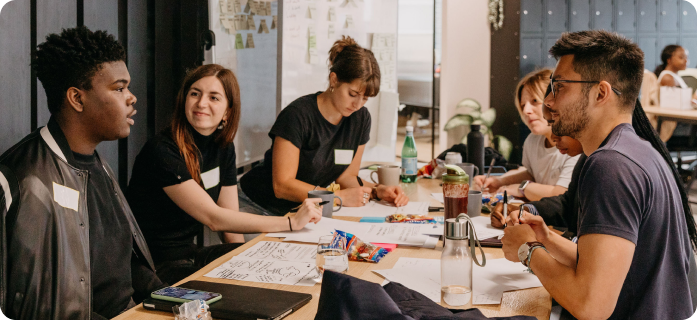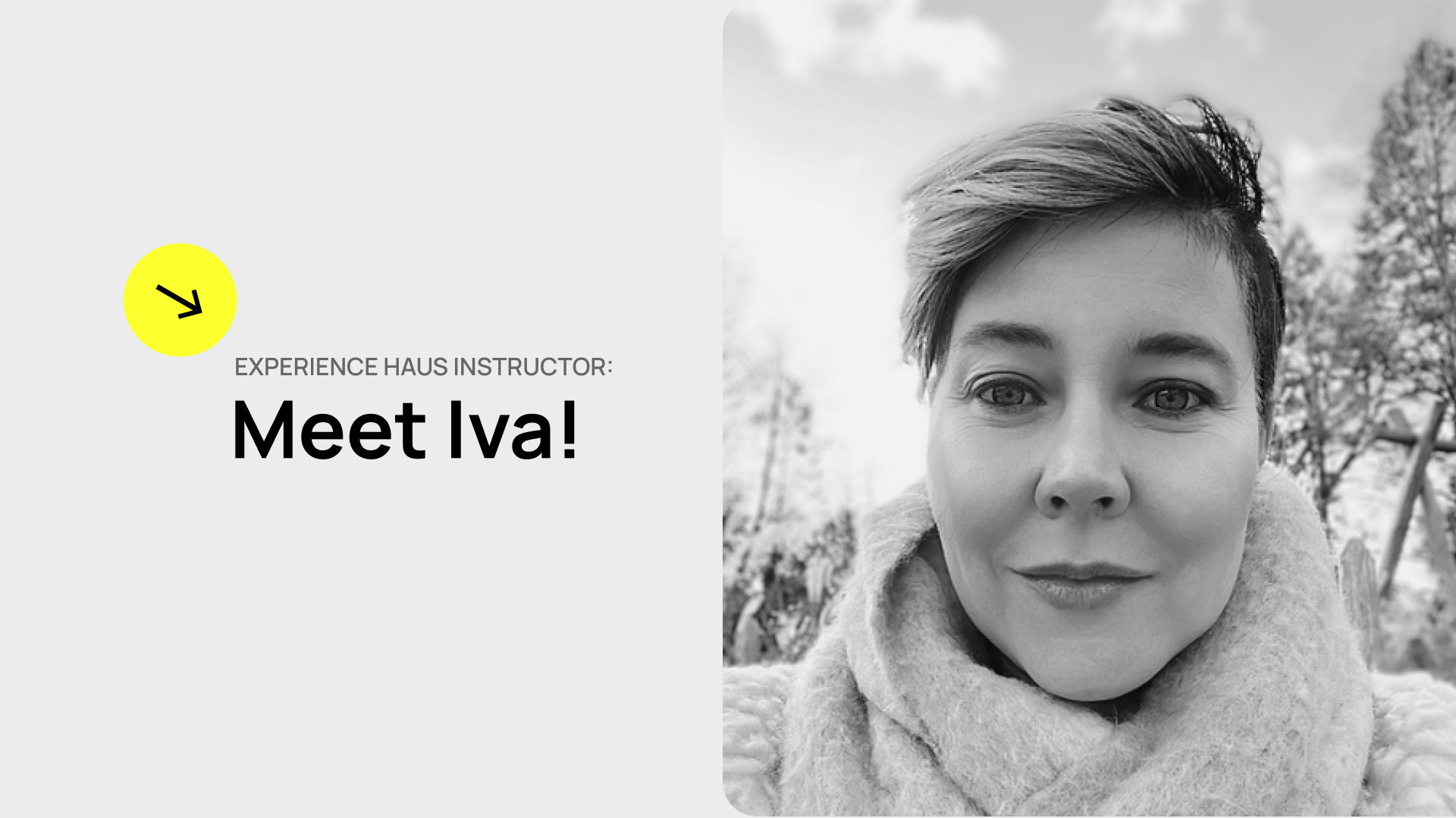A Conversation About Design: Revolutionising the Way Businesses Think with the One-Page Simple Method
Experience Haus Creative Director and Founder Amit Patel recently sat down with Garth Jemmett, the founder and owner of We Explain Stuff, a visual communications consultancy renowned for his one-page simple method.
Specializing in making complex products, services, and strategies easy to understand, Garth and his team drive sales and enhance clarity through a blend of storytelling, visual thinking, and data analysis. With a proven track record across banking, insurance, healthcare, and technology sectors, Garth’s approach has been battle -tested in environments where clear communication is critical.
Garth’s commitment to clarity and communication is not just his profession, but his passion, constantly seeking innovative ways to bridge communication gaps and inspire understanding in the business world.
Can you tell us a bit more about the work you do at We Explain Stuff? What prompted you to set that business up?
The thing that I’ve learned over the years of starting and running a business is the way that you serve the market might change and your market might even change, but your underlying philosophy seldom does. It just gets more and more into focus.
What I mean by that is I used to work in advertising. I was an art director for TBWA, which is a big global network. I was part of the South African branch in Cape Town, which is where I’m originally from. It was a really great business that I worked at, but I wanted to get into stuff that was a little bit more complex. I wanted to work with businesses that were more complex because I had a knack for being able to take things that were inherently a little complicated and make them simple. However, I felt advertising wasn’t really giving me the space to do that.
What I then ended up doing was getting into things like animated videos, infographics, and those kinds of things, because the reality is, as something gets more complicated, your comprehension goes down. So you’ve got to really use visuals and graphics and diagrams and stuff to explain stuff that’s more complicated.
Where that took us as a business over the course of 20 years is it initially was a bit of change management, it was internal communication. However, more and more over the last couple of years, it moved very much into what you would almost call “sales enablement”. This means helping a team that has to sell a product or service, whether that’s a sales team or even the founder and their team, articulate their value in a really crisp manner.
So what we do as a business is work extremely hard to make a business understandable in the simplest way and you do that by making it one page simple. How do you tell the story of your business on a page where the value of it comes across immediately? If you think about it in the shape of a pyramid where that one page is the tip of the pyramid, and then you cascade down into more granular information below. This method helps businesses that are either complex or struggling to make their message clear.
Do you work with a typical type of client like established businesses or brand new companies?
The traditional businesses I’ve been working with over the last 15 or so years have been corporates eg. large banks, large insurers etc. I would say, however, my passion is more in that early to funding phase. I know how difficult it is and I’ve got a lot of empathy there with founders who see their business growing and thinking, ok how do we get this right? The way we’ve structured our methodology is it’s modular. You can start off with a smaller piece of it and then move onto the next piece, and then the next piece, and then everything just slots into place. For example, if you start with a one-pager about your business, this information can then be used in other materials like an explainer video or a comprehensive sales aid. So the one thing moves onto the next, and what I usually say to clients is to see the one-pager as the cornerstone of your business. This is the first bit of information that you need to get 100% right, and then it’ll be easy to get the rest right.
So, to answer your question, I would say founder-led businesses that are trying to either scale sales or there’s a founder that has a lot of IP locked in their head and are trying to get it down onto paper in a manner that the rest of the team understands. I think that’s the challenge with a lot of founders – they are so switched on and so entrenched in their genius, it’s really difficult to pull that out and simplify it.
Can you tell us a bit more about your book: what inspired it? What are you looking to deliver in terms of value to those who pick it up?
With the book, I started out with the end in mind. My biggest frustration was there’s a lot of business books out there, but how many of them do you actually come away with a very clear takeaway that you get really quickly? So, what I did is I decided I wanted the reader to finish it in 30 minutes. That was something I was very keen on getting right.
There were five questions I wanted to ask in the book, and those five questions are split into three sections:
- The front of a business (call it the front office), that is essentially your marketing and sales. This includes anyone on the call phase, meeting clients, getting clients to come engage with you
- The middle office is essentially the heart of your business. This is your vision, mission, strategy and values
- The back office is your value delivery system. This includes the operations, finance and systems
To have a successful business, all of those need to work in unison. So I thought to myself, coffee is such a great metaphor to use for business. First of all, it can be ground, it can be sold whole, there’s different flavours, there’s quite different coffee brands, so it really lends itself to quite a lot of versatility. Then my wife showed me a quote which said “I don’t need another inspirational quote, I need coffee,”and I thought that’s actually such a great name for a book!
The five questions the book in essence asks are:
- Why do you do what you do?
- How do you get clients?
- How do you keep those clients?
- How do you deliver what you promise?
- How do you teach others?
Each section is colour coded in the book and it unpacks that specific part of the journey for the coffee shop owner. There’s a lot of metaphors and analogies and visual thinking, which is a lot of what we use with our clients when we’re helping them unpack their own story for their business.
have you had any feedback from people that aren’t yet running their own businesses that found it useful for them to read?
I haven’t had anything from freelancers, but what I have had is there is almost a universal appeal to those five questions. So far I haven’t had one person that’s read it and gone “I haven’t gotten something out of it”
The big thing for me when I was writing it was making sure it was about the reader, it was about someone actually getting some proper practical advice out of it.
What have you learned personally when writing this book, and what have you learned about business through this process as well?
Firstly, it’s really important to make stuff simple. When you’re writing for an audience, everyone always thinks that you need to be a little more academic to sound smarter, and I think that’s a big mistake. I think you’ve got to write it in a way that a user can easily engage with.
What I learned about the business writing the book was how much I still need to get right! There are so many parts where I can see there’s some squeaky wheels that I need to fix.
You mentioned you’re thinking about writing a second book. What’s it going to be about and how will it be different from what you’ve done before?
I’m finding a lot of founders who either have a service business or have a business that’s reasonably complex are really struggling to articulate their value in simple terms. So what I’ve done is I’ve been working on a very simple canvas, like a framework, and I’ve tested this about 200 times since the start of Covid. Around 60 of these ideation sessions have been done with founder-led businesses and in that I’ve seen the questions that resonate with founders and which ones that don’t. So what I’ve done is I’ve fine-tuned my framework around that, and I’ve actually gone, hang on, there’s another book here. This is a real challenge where founders are struggling to get their story straight.
So I’m going to do the same thing again. I’m going to make it 30 minutes long, make it illustrated and use graphics and diagrams, but my purpose with that is to take it a step further. I actually then want to turn it into a course that I can teach others because, I can see the coffee book was really enjoyed and I think there’s still merits in turning that into a course, but I think with this, there is a real need.
To close, where do you see yourself in five years? What do you think you’ll be doing or working on?
For me, I’m very passionate about teaching up-and-coming businesses, and I think I want to work less on my business and more on other people’s businesses with them. If I can get this right, help businesses get their story straight and turn it into something I can teach others, it means I can make it a platform business of sorts. Then I can actually go around helping others get their story straight. At the moment, I think so many business owners just get totally stressed out running their businesses and I think a lot of that has got to do with the founder being in the middle of the business, and often they don’t know how to move out of that. So if I can play a small part in that, I would definitely enjoy being on that journey. It would fulfill a big purpose need in me, I think.
This article forms part of a discussion conducted between Garth Jemmett and Experience Haus Creative Director, Amit Patel on the Experience Haus podcast, ‘A Conversation About Design’. In this podcast, we explore the fascinating world of design featuring insightful conversations with some of the brightest minds and inspiring individuals who are making waves in the industry.
Listen to the full interview with Garth here.




